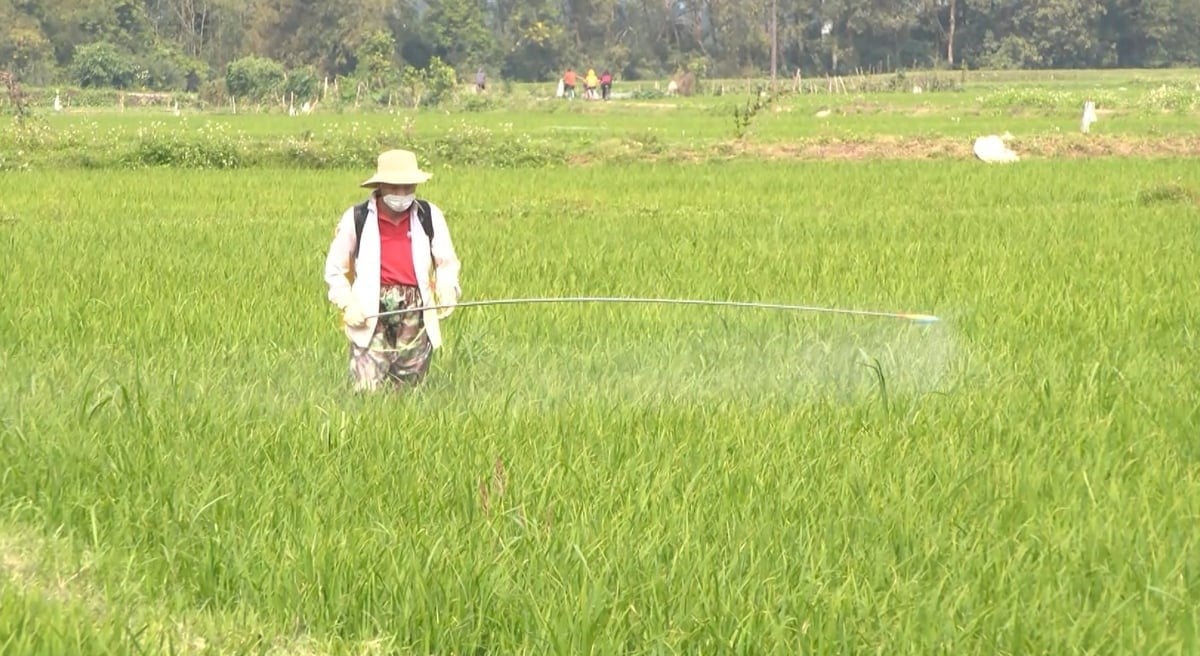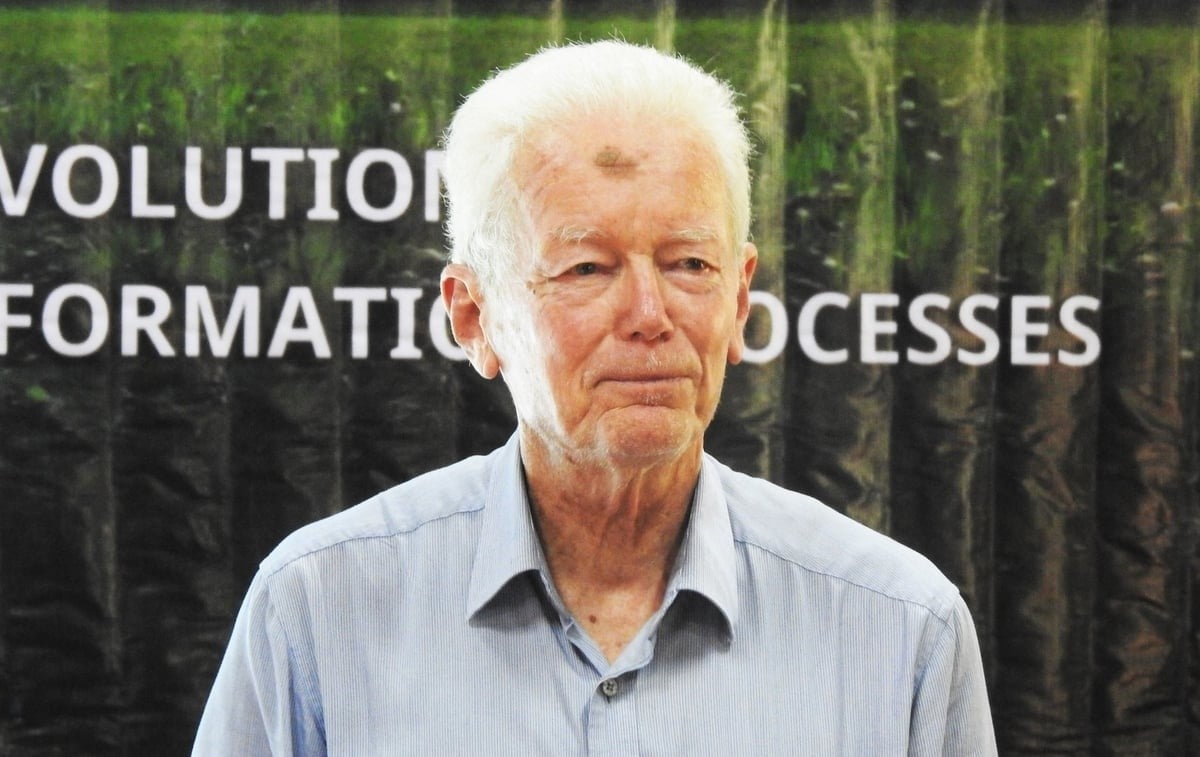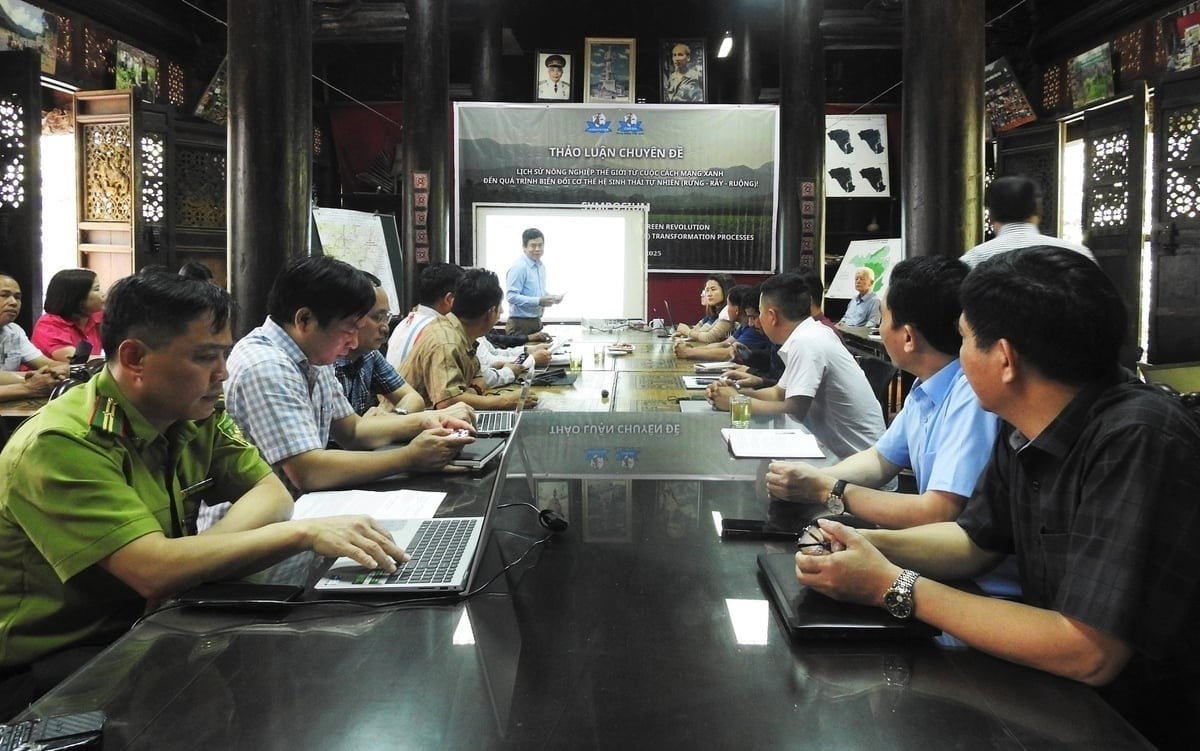June 1, 2025 | 12:19 GMT +7
June 1, 2025 | 12:19 GMT +7
Hotline: 0913.378.918
June 1, 2025 | 12:19 GMT +7
Hotline: 0913.378.918
In Huong Son district (Ha Tinh), the Center for Human Ecology Studies of Highlands (CHESH) recently organized a thematic seminar titled “History of Global Agriculture from Green Revolution to Transformation of Natural Ecosystems (Forest – Swidden – Paddy Fields).”
During the seminar, numerous domestic and international agricultural experts offered critical assessments regarding the current situation and proposed solutions for shifting from industrial agriculture to agroecology.

The agriculture that overuses pesticides and chemical fertilizer has been "out of time." Photo: Thanh Nga
Dr. Keith Barber from the University of Waikato (New Zealand) assumed that industrial agriculture is now using 80% of global arable land but producing only 30% of the food consumed by humans. The remaining 70% of food is produced by small-scale traditional farmers. The root cause of the crisis in industrial agriculture lies in its profit-driven nature, dominated by multinational corporations, rather than in the goal of providing safe and nutritious food for humans.
“Everywhere, industrial agriculture is destroying small-scale biodiversity, adversely affecting human health and the environment, degrading soil, polluting irrigation systems, and emitting vast amounts of greenhouse gases. Thereby contributing to global warming and climate change.
“In other words, industrial agriculture has been 'outdated.' As a result, a comprehensive overhaul or a revolution in the direction of embracing ecological agriculture is needed to bring health and peace to people,” Dr. Keith Barber emphasized.
Mr. Phan Thanh Tung, Vice Chairman of the People’s Committee of Son Kim 1 Commune (Huong Son district, Ha Tinh province), expressed concern: “Some biological preparations used to restore agricultural soils have shown positive results. However, for people, the safety and long-term impacts of these preparations remain unclear.”

Dr. Keith Barber (University of Waikato, New Zealand) assumed that it is necessary to have a revolution to switch from industrial agriculture to ecological agriculture. Photo: Thanh Nga.
In response to this concern, Dr. Keith Barber affirmed that enzyme-based biological preparations create microorganisms that nurture soil health. As such, they are considered safe not only for the soil and the environment but also for human health. Therefore, as the land fund for agricultural production is increasingly limited, the use of biological preparations should be encouraged to protect the ecosystem.
Scientists believe that to increase food production in the same cultivation area with less energy, chemical fertilizer, pesticides, and water, producers must live harmoniously and rely on nature. More specifically, apply biotechnology to organic production and agroecology.

Mr. Phan Thanh Tung, Vice Chairman of the People's Committee of Son Kim 1 Commune (Huong Son district, Ha Tinh province), spoke at the seminar. Photo: Thanh Nga.
“The core of ecological agriculture lies in realizing farming systems by learning from and integrating them with traditional farming methods. By adding organic substances to the soil and building a healthy surrounding environment, the soil will be immunized against erosion and barrenness, and crops will be protected from pests and diseases, yielding high productivity and quality,” said Ms. Tran Thi Lanh, Founding Chairman of CHESH.
According to Ms. Lanh, Ha Tinh province currently has a mountainous and forested terrain that accounts for roughly 60% of its total area. If ecological agriculture can be applied to production, especially in cultivating specialty fruit crops such as Phuc Trach pomelo, Huong Son orange, Vu Quang and Huong Khe orange, it will be great.
Particularly for forestry, surveys indicate that Ha Tinh now has over 1,000 hectares of forest land planted with acacia trees, which provide significant economic resources for local farmers. However, continuing to plant acacia monocultures in the current manner could have long-term costs.

Overview of the seminar. Photo: Thanh Nga.
“I think in the coming time, Ha Tinh needs to study and balance the average annual reduction of about 10% of the acacia area to replace it with indigenous crops. In 10-15 years, the carbon will be measured, and then sold. This resource will be large and sustainable,” Ms. Lanh emphasized.
Industrial agriculture is no longer sustainable in today’s context. It is destroying nature and causing countless environmental, economic, and social issues. It is time to switch to agroecology, a farming method of learning from nature, living harmoniously rather than against it, and providing sustainable and healthy food for humans.
Translated by Thu Huyen

(VAN) Several scientists and farmers are experimenting with soil treatment in some key durian-growing regions such as Cai Lay (Tien Giang), Dak Song, Gia Nghia, and Dak R’lap (Dak Nong).
/2025/05/25/4127-3-073637_820.jpg)
(VAN) Thanks to the promotion from an FAO-implemented project, vegetable production in greenhouses in Moc Chau has seen strong development, from 1.5 hectares in 2021 to nearly 50 hectares in 2024.

(VAN) FAO has recently supported USD 140,000 to implement the project 'Risk mitigation human-animal interface risks through disease control initiatives in pig farming.'

(VAN) The People's Committee of Tra Vinh province has approved an adjustment to the investment policy for the Green Hydrogen Plant project, increasing its area to approximately 52.76 hectares.
![Reducing emissions from rice fields: [2] Farmers’ commitment to the soil](https://t.ex-cdn.com/nongnghiepmoitruong.vn/608w/files/news/2025/05/05/dsc08881jpg-nongnghiep-140632.jpg)
(VAN) Clean rice cultivation model in Thuong Tan commune, Bac Tan Uyen district, is assisting local residents in achieving sustainable agriculture by substantially reducing costs, increasing productivity, and protecting the environment.

(VAN) At the conference to disseminate Resolution No. 68, AgriS introduced its digital agricultural ecosystem and reaffirmed its commitment to accompanying the Government in promoting private sector development and sustainable agriculture.

(VAN) 'Blue Ocean - Blue Foods' initiative is designed to restore marine ecosystems and establish sustainable livelihoods for local communities by cultivating a minimum of 1,000 hectares of cottonii seaweed in the first three years.